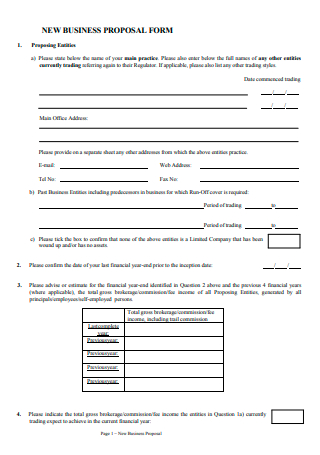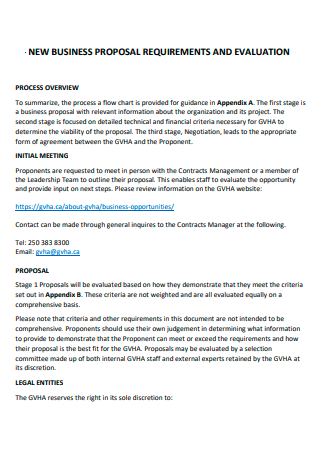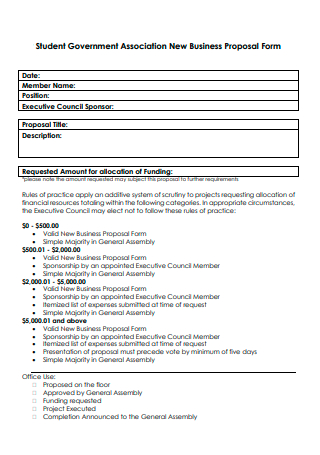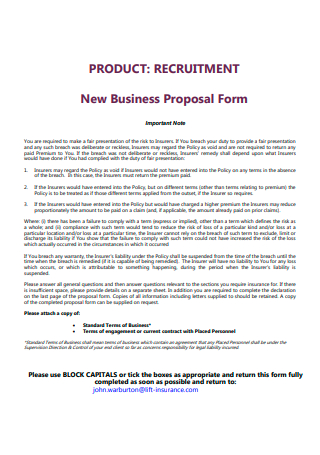3+ Sample New Business Proposal
FREE New Business Proposal s to Download
3+ Sample New Business Proposal
a Business Proposal?
Benefits of a Business Proposal
Elements of a New Business Proposal
How To Create a New Business Proposal
FAQs
How should a proposal be formatted?
What is the difference between a Business Plan and a Proposal for a Business?
Why use Business Proposal Templates?
What Is a Business Proposal?
A business proposal is a legal, written offer to sell a product or service to a prospective buyer. The proposal may respond to a formal Request for Proposal, a request for bids from suppliers issued by the prospect. The business proposal serves as a record of the provider’s offer. It often comprises a concise summary of the prospect’s problem, why you are uniquely qualified to solve it, your general approach, and an estimate of the cost to solve it. Additionally, it offers a brief report of your organization and the individuals who will be tasked with resolving the issue. According to the BLS, around 20% of new businesses fail within the first two years of operation, 45% within the first five years, and 65% within the first ten years. Only 25% of new firms survive 15 years or more.
Benefits of a Business Proposal
Business proposals are documents that summarize any study or ideas about a particular subject. For instance, a business proposal for a new product will include the funding necessary to launch the product, a list of individuals responsible for product development, and a strategy outlining how the product will be established. All of this knowledge is quite useful when it comes to making executive decisions. Here are a few of its advantages.
Elements of a New Business Proposal
Whether you own a tiny firm or a large corporation, you will need to prepare a business proposal at some point. Successful company proposals are the result of strategy and planning. If this is your first attempt at writing one, do not expect to win a customer on the first try. Continue practicing until you get it correctly. To get you started, analyze the following seven components that any excellent business proposal must include:
Solutions
Your customer is in search of resolutions to their issues. That is the primary criteria they will use to evaluate the ideas they get. As a result, you must mention your proposed remedies in the first paragraph of your proposal. You’ll want to begin by stating how your company’s products or solutions can help them address their difficulties. As you continue, you can provide evidence to support your assertions.
Samples
It is insufficient to assert your ability to deliver results. You must substantiate your statements with examples and evidence of what you can do for the customer. If you’re attempting to sell something, consider providing them with a sample. If you’re offering a service, present them with a portfolio of your previous work. This data will assist them in gaining a better grasp of what you are capable of delivering. Consider converting your proposal system to an online business proposal template to improve the efficiency and branding of your proposals, as well as their visual attractiveness.
Credibility
How reliable is your business? To earn clients’ trust, you must establish your company’s credibility. Your business proposal should demonstrate your trustworthiness by incorporating endorsements from external parties or case studies from prior customers. The more credibility you establish for your business in the customer’s eyes, the more likely they will accept your proposal.
Benefits
What are the advantages of hiring your firm? Apart from the answers, you can offer consumers, what more can your business do to make them feel special? For example, are you capable of adhering to stringent deadlines? Can you keep their information private while collaborating with them? Create a section in your business proposal that details all of the benefits of collaborating with your organization. List each of your company’s unique characteristics, such as confidentiality, efficiency, and customer service.
Value
The price of your bid will be on the customer’s mind throughout their reading of your proposal. To satisfy the consumer, the benefits of your submission must outweigh the bid price. In other words, the proposal’s worth is equal to the benefits minus the cost. If the benefit outweighs the cost, your idea will be highly valued. You should clearly define how your consumer would benefit from partnering with you to justify the bid price.
Language
Ascertain that the terminology used in your business proposal is consistent with the language your customer typically uses. For instance, if you’re sending a proposal to an engineering firm, make sure to include industry-specific keywords and phrases. This targeted wording demonstrates to the customer that you and the customer speak the “same language.” The familiarity, in turn, will foster trust. As an outcome, they will feel more at ease in the future interacting with you.
Energy
Your business proposal should be a direct reflection of your passion for the transaction. Do not simply utilize repetitious and superfluous templated wording. Demonstrate your enthusiasm and desire for working with the customer and the mutual benefit that will result. By demonstrating this level of commitment in your proposal, you will convey to the consumer that you are serious about the sale.
How To Create a New Business Proposal
Developing a new business proposal is a comprehensive process that includes several stages that may overlap. If you are drafting your plan from scratch or using a simple business proposal template, or whether you are working with an experienced business plan writer or consultant, the following five steps will guide you through the process.
Step 1: Research
The process begins with extensive research into the industry, customers, competitors, and operating costs of the business. Research can be conducted using various materials, from databases and papers to direct interviews with other entrepreneurs and potential clients. The study should be meticulously documented and structured with the material acquired and the source, as the plan will require citations.
Step 2: Strategize a plan.
Following that, the research findings should inform the business plan you adopt. Revisit the strategy you developed before conducting your research and delve deeper into decisions on proper marketing budgets, operations, and hiring for the company’s first five years. Generally, strategy draws on industry best practices, but merely as a framework for adding highly differentiated activities that produce a competitive edge.
Step 3: Evaluate the cost.
Each activity you select for your plan incurs some expense and generates some revenue. Create a financial picture by determining if revenues will cover all costs and provide room for profit in the long run. Begin by incorporating your economic assumptions and startup costs into a financial model that can offer a first-year cash flow statement for you, providing the most accurate estimate of the cash required to sustain your early operations.
Step 4: Draft the plan.
After you’ve established your financials and developed a strategy, it’s time to compose the narrative for each part and component of your business plan. With the background work accomplished, the actual drafting process should be relatively painless. If you are having difficulty writing persuasive prose, now is the moment to seek the assistance of a business plan journalist who can put the plan together from this point.
Step 5: Proofread and Revise
Revisit the entire plan to identify any concepts or language that are unclear, redundant, or irrelevant to the arguments made in the project. Finally, thoroughly proofread for spelling, grammar, and formatting, soliciting the assistance of others to act as additional eyes. You may suffer burnout after working on the plan for an extended period and feel the need to place it aside for a while to re-evaluate it with new eyes.
FAQs
How should a proposal be formatted?
A proposal typically includes a brief description of the problem, solution, expenses, and benefits in the introduction. Subject, purpose, primary argument, background information, and importance are all part of the issue’s primary definition.
What is the difference between a Business Plan and a Proposal for a Business?
A business plan is quite distinct from a business proposal. If you conduct an Internet search to write a business proposal, you will discover that most of the results are devoted to developing a business plan. Despite this, the two texts serve distinct purposes and objectives. A business plan is a factually accurate summary of a company’s operations and prospects. A business proposal is a focused sales document that describes how a business would handle a project, articulates the project’s value to the customer, and solicits the client’s business. A business strategy is a written summary of pertinent facts. A business proposal is a combination of a quotation and a call to action.
Why use Business Proposal Templates?
A business proposal is an authoritative document that details your business idea or model. It is supposed to include a cover page that contains a brief introduction. Following that, you’ll ease into the actual proposal. The primary purpose of such business proposals is to establish a good strategy that will guide the company forward. When dealing with such essential documents, it is usually prudent to seek professional assistance. That is why you should review the business proposal templates included in this area. According to statistics, over 543,000 new firms begin each month, but only seven out of ten survive the first two years, while five survive after five years. Surprisingly, almost 70% of organizations that survive five years adhere to a strategic business plan.
A business proposal is a relatively broad term; numerous proposals are offered to a corporation daily. Consider sales presentations. You may also utilize the sales proposal templates listed here to create a sales pitch to your supervisor. All that is required is a close examination!




